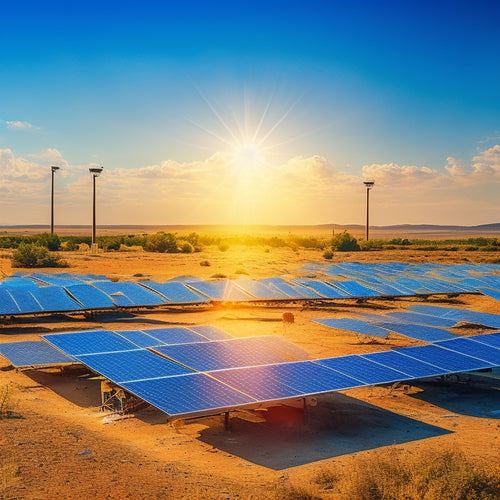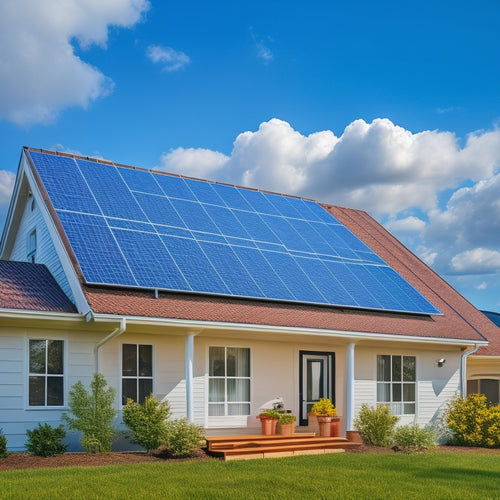
Cost of Solar Panels for House
Share
You're considering investing in solar panels for your house, and the first thing on your mind is the cost. The initial investment can be substantial, but it pays off in the long run. Solar panels can elevate your property value by up to 17%, and you'll save money on utility bills. In fact, every dollar spent on solar panels can improve your property value by $1.30 to $1.60. Additionally, you'll enjoy a 30% tax credit for solar installations and various state incentives. As you investigate the benefits of solar energy, you'll realize how it can change your home's energy efficiency and enhance your financial security.
The Essentials
- Solar panels reduce energy consumption and utility bills, leading to financial freedom and energy independence from utility companies.
- The typical American household can save money on utility bills, with solar panels offsetting initial costs through financial incentives like the 30% federal tax credit.
- Solar panels increase property value by up to 17%, providing a significant return on investment and increased home equity.
- Every dollar spent on solar panels can enhance property value by $1.30 to $1.60, making solar energy a smart financial decision.
- Homes with solar panels sell faster and for higher prices, due to their energy-efficient features and increased resale value.
Zero Energy Bills Await
You can start saving money on your energy bills today by utilizing the power of solar energy.
With solar panels, you'll generate free electricity and reduce your reliance on the grid, leading to lower utility bills.
By investing in innovative technologies like Renewable Energy Solutions, you can tackle three major concerns at once: reducing electricity bills, providing backup power during outages, and minimizing your carbon footprint.
Energy Savings Today
A typical American household consumes around 900 kilowatt-hours of electricity per month, translating to a hefty utility bill.
However, by going solar, you can greatly reduce your energy consumption and start saving money today. With solar panels, you'll generate your own clean energy, reducing your reliance on the grid and your utility bills. This means you'll enjoy energy independence, no longer bound by the whims of utility companies.
By investing in a Home Solar Power Generator, you'll have a reliable Renewable Energy System that provides backup power during outages and reduces your energy bills.
Additionally, there are financial incentives to going solar. The federal government offers a 30% tax credit for solar installations, and many states offer additional rebates and incentives. These financial benefits can help offset the initial cost of solar panels, making them a more affordable option.
By switching to solar, you'll not only reduce your energy bills but also increase your property value and contribute to a cleaner environment.
With solar panels, you'll be taking a considerable step towards energy independence and financial freedom.
Lower Your Bills
As the solar panels capture the sun's energy, your utility bills will dwindle, ultimately leading to a drastic reduction in your energy expenses.
By utilizing the power of the sun, you'll not only reduce your carbon footprint but also mitigate energy price fluctuations, ensuring a reliable and long-term solution.
You'll experience the thrill of watching your energy costs plummet, giving you more financial freedom to pursue your passions.
With solar panels, you'll produce your own clean energy, reducing your reliance on the grid and slashing your electricity bills.
Increases Property Value Fast
You'll see a significant increase in home equity once you install solar panels, which translates to enhanced property worth.
In fact, a study found that renewable energy systems can increase property value by up to 17%.
This is because solar panels are viewed as a beneficial upgrade, making your home more attractive to potential buyers if you decide to sell.
As a result, you can expect a higher resale value, which can be a significant return on investment.
Boosts Home Equity
Installing solar panels can greatly enhance your home's equity, with every dollar spent on solar panels potentially increasing your property value by $1.30 to $1.60. This significant increase in home equity is a direct result of the solar investment, which can lead to a substantial return on investment.
As a homeowner, you can reap the benefits of increased property value, which can provide a sense of financial security and freedom. The rise in home equity can also provide you with more financial flexibility, allowing you to tap into your home's equity for future projects or expenses.
Additionally, solar panels can increase your home's appeal to potential buyers, making it more attractive and beneficial in the long run. By investing in solar panels, you're not only reducing your carbon footprint but also making a smart financial decision that can benefit you for years to come.
With solar panels, you can enjoy the benefits of increased home equity, financial freedom, and a reduced reliance on fossil fuels.
Increases Resale Value
While solar panels offer numerous benefits, one of the most significant advantages is their ability to enhance resale value. You'll be pleased to know that solar panels can elevate your property's value by up to 17%. This is especially true in areas with high demand for sustainable living and renewable energy.
According to recent solar market trends, homes with solar panels sell faster and for more money than those without.
By investing in solar panels, you're not only reducing your carbon footprint but also increasing your property's appeal to potential buyers. This is because many homebuyers are willing to pay a premium for energy-efficient features.
Additionally, investment incentives like tax credits and rebates can help offset the initial cost of installation, making it a more attractive option for homeowners.
As you consider installing solar panels, remember that you're not only saving money on your energy bills but also making a smart investment in your property's future.
With the increasing demand for sustainable living, it's no wonder that solar panels are becoming a key selling point for homeowners looking to maximize their resale value.
Efficient Energy Storage Systems
You're likely considering efficient energy storage systems to complement your solar panels, and for good reason.
With power backup solutions, you'll have peace of mind during outages and grid failures. In fact, incorporating renewable energy storage into your system can greatly reduce your utility bills.
Additionally, off-grid solar systems can provide independence from the grid and guarantee a steady supply of energy.
When selecting a system, be certain to evaluate battery life expectancy, a critical factor in determining the overall return on your investment.
Power Backup Solutions
About 95% of solar panel owners consider power backup solutions a necessity to guarantee a steady supply of electricity during outages or at night. You're not alone in wanting to make certain your home remains powered even when the grid goes down. By investing in efficient energy storage systems, you're not only securing your energy independence but also increasing the value of your property.
When choosing a power backup solution, consider the following factors:
| Solution | Advantages | Disadvantages |
|---|---|---|
| Battery Backup | Provides reliable power during outages, low maintenance | Higher upfront cost, limited scalability |
| Generator Backup | Cost-effective, scalable | Noisy, requires frequent solar panel maintenance |
| Grid-Tie Inverter | Automatically switches to grid power during outages, eligible for renewable energy incentives | Limited power output, requires grid connection |
Battery Life Expectancy
Reliability is the cornerstone of efficient energy storage systems, and battery life expectancy plays a vital role in guaranteeing a steady supply of electricity when you need it most.
As you invest in solar panels for your house, you'll want to take into account the lifespan of your batteries to guarantee uninterrupted power.
Typically, deep cycle batteries used in solar systems last between 5 to 15 years, depending on factors like usage, maintenance, and quality.
To maximize their lifespan, you'll need to follow proper battery maintenance tips, such as monitoring temperature, checking electrolyte levels, and avoiding deep discharging.
Regularly inspecting your batteries can help identify potential issues early on, preventing unexpected failures.
When your batteries eventually reach the end of their life, you'll need to evaluate battery replacement options.
This may involve replacing individual cells or the entire battery bank, depending on the type of system you have.
Assess Your Roof's Shading
When evaluating your roof's shading, you'll need to identify obstructions that can impact solar panel performance, such as skylights, vents, and chimneys.
With the increasing popularity of off-grid generators and renewable energy solutions, it's crucial to contemplate the impact of shading on your solar panel system's efficiency deep cycle batteries.
Next, you'll want to analyze the shading pattern on your roof, bearing in mind the time of day and year, as well as the surrounding environment.
Roof Obstructions to Consider
You'll need to evaluate your roof's shading to confirm peak solar panel performance. As you assess your roof, consider any obstructions that may impact solar panel installation and efficiency.
Roof angles, for instance, can greatly affect the performance of your solar panels. Steep roof angles can lead to installation challenges, making it difficult to secure the panels properly.
Additionally, you'll need to identify any roof features that cast shade on the area where you plan to install the panels. This could include chimneys, vents, skylights, or even nearby trees.
These obstructions can reduce the amount of sunlight that reaches your solar panels, decreasing their overall efficiency. Take note of these potential obstacles to confirm your solar panel system is installed in a way that maximizes energy production.
Shading Pattern Analysis
A thorough shading pattern analysis is essential to determine the ideal placement of solar panels on your roof. This assessment helps identify areas that receive partial or full shade throughout the day, which can greatly impact the performance of your solar panel system.
You'll want to examine the shading impact of various obstructions, including trees, buildings, and roof features like vents, skylights, and chimneys.
To conduct a shading pattern analysis, you can use specialized software or work with a solar panel professional who can assess your roof's shading using 3D modeling tools. This analysis will provide a detailed report on the shading patterns and intensity throughout the day, helping you identify the best locations for your solar panels.
With this information, you can develop shading solutions that minimize the impact of shading on your system's performance. By optimizing your solar panel placement, you can maximize your energy production and reduce your reliance on the grid, ultimately achieving greater energy independence.
Low Carbon Footprint Guarantee
When you invest in solar panels, you're not only saving on energy costs, but you're also reducing your carbon footprint.
By utilizing renewable energy from the sun, you'll greatly decrease your reliance on fossil fuels, which is a major contributor to greenhouse gas emissions.
As you consider the cost of solar panels, remember that a low carbon footprint guarantee is an important benefit that comes with this eco-friendly investment.
Reducing Carbon Emissions
Solar panels offer a powerful solution for reducing carbon emissions, with a low carbon footprint guarantee that's becoming increasingly important for environmentally conscious homeowners and businesses. By utilizing solar energy, you're not only reducing your reliance on fossil fuels but also minimizing your environmental impact.
The solar energy benefits are undeniable - for every megawatt-hour of electricity generated from solar panels, you're preventing roughly 1,400 pounds of carbon dioxide emissions.
As you consider the cost of solar panels for your house, remember that investing in solar energy is an essential step towards reducing your carbon footprint. With solar panels, you'll be producing clean energy and markedly decreasing your contribution to greenhouse gas emissions.
This, in turn, helps combat climate change and guarantees a healthier environment for future generations. By choosing solar energy, you're taking a proactive approach to reducing your environmental impact and securing a sustainable future.
Frequently Asked Questions
How Long Does It Take to Install Solar Panels on My House?
You'll typically spend 1-3 days preparing for the installation process, and 1-5 days for the actual installation timeline, depending on your home's size and complexity, before you can start utilizing the freedom of renewable energy.
Can I Install Solar Panels on My Own Without a Professional?
You can attempt a DIY solar installation, but be prepared to tackle installation challenges like roofing, electrical, and permitting intricacies, which may lead to safety risks, warranty voidance, and reduced system efficiency if not done correctly.
Do Solar Panels Work on Cloudy or Rainy Days?
You're wondering if solar panels work on cloudy or rainy days? Yes, they do, but their solar efficiency decreases, affecting energy production. On cloudy days, you'll generate around 10-20% of the energy you'd produce on a sunny day.
Are There Any Government Incentives for Solar Panel Installation?
As you utilize the power of the sun, you're not alone - Uncle Sam's got your back! You'll access federal tax credits and state rebates, sweetening the deal on your solar panel installation, giving you financial freedom to shine bright.
Can Solar Panels Be Installed on a Metal or Tile Roof?
You can install solar panels on a metal or tile roof, but you'll need to evaluate metal roof's structural integrity and tile roof's compatibility with solar panel mounting systems, ensuring a secure and watertight installation.
Final Thoughts
As you flip the switch, your solar panels spring to life, capturing the sun's energy to power your home. Imagine waking up to a zero-energy bill, your wallet smiling as your property value soars. With efficient energy storage systems, you're the ruler of your own eco-friendly domain. Assess your roof's shading, and let the low carbon footprint guarantee be your badge of honor.
Related Posts
-

What Happens Without a Charge Controller in Solar Panels
Without a charge controller in your solar panel system, you risk overheating batteries due to overcharging, which can...
-

Cost of Solar Panel Installation
You can expect to pay between $15,000 and $30,000 or more for a typical solar panel installation, depending on the sy...
-

Designing a Green Roof for Maximum Energy Efficiency
Designing a green roof for maximum energy efficiency involves several key strategies. Start by selecting native, drou...


